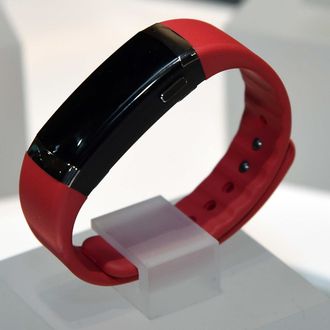
Once the hangover wears off, many people will greet the New Year by putting their long-neglected fitness trackers back on, with high-minded goals of becoming fitter and healthier by accounting for every step taken and every calorie torched. But some new research points to an overlooked downside to using a Fitbit or an Apple Watch: They serve to remind the user that working out is kind of a chore.
That’s according to an upcoming study in the Journal of Consumer Research, led by Jordan Etkin, assistant professor of marketing at Duke University’s Fuqua School of Business. “In general, tracking activity can increase how much people do,” Etkin said in a press release. But measuring all that physical activity is a double-edged sword that Etkin called “pernicious”: It makes working out feel like a drag. “Enjoyable activities can become almost like a job, by focusing on the outcomes of things that used to be fun.”
Researchers conducted a series of tests to come to this conclusion, but one of the most eye-opening involved asking 95 people to record their thoughts doing the most mundane of everyday activities: walking. One group was offered the option to check a pedometer regularly; all but four people in this group chose to do so. The other had a pedometer but the display was taped over (only the researchers knew how much this second group was actually walking). The first group who regularly checked their pedometers walked farther on average. But they also reported the walk being less enjoyable, even though they were the group that chose to use the pedometers.
There’s some mixed anecdotal reviews of how fitness trackers juice competitiveness but make exercising seem like yet another chore to do. In a piece for The New Yorker, humorist David Sedaris recounts how he starts feeling compelled to beat personal records obsessively. But “supertrackers” — those who record every calorie consumed and burned — have been hailed as dieting success stories. Etkin has a possible explanation for this weird dichotomy in how our brains process fitness trackers: “We’re curious creatures and tracking information is very seductive, even for enjoyable activities,” she said. “Simply making it available made them [the walkers with the pedometers] want to look at it, but the very people who self-select into measurement are the ones who are hurt by it.”
Workouts that aren’t inherently fun are one of the top reasons why people stop exercising, replacing all those lofty New Year’s goals with groans and canceling plans at the gym. This isn’t just bad for your muscles; it’s bad for your brain and mental health. So what’s a Fitbit fanatic to do? Here, the research and moral of the story preach the same nagging-but-true aphorism: Moderation is key. “[W]e need to balance that increased productivity against our underlying enjoyment,” Etkin said. “For activities people do for fun, it may be better not to know.” And, by the way, there’s no good evidence that you really need to walk 10,000 steps a day, anyhow.

